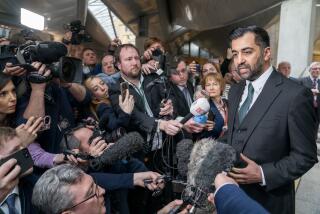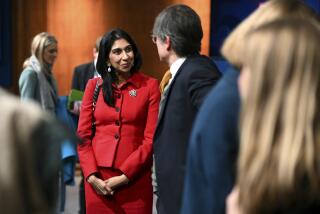Migrant Unease in Britain
- Share via
BIRMINGHAM, England — Azmat Begg has noticed it the last few weeks when he’s taken his walk each morning, the way he has every day, in the same park, for the last 30 years.
No one will look him in the eye.
For years, Begg has been a recognizable face here in Birmingham’s business community, working as a banker, then a real estate broker. Even when his son was arrested in Pakistan in 2002 and sent to Guantanamo Bay, Cuba, even after last summer’s bombings in London, fellow Britons would make it a point to greet him, shake his hand, ask him how his family was.
That all changed Aug. 10, when more than two dozen British Muslims, including at least two from Birmingham, were arrested in raids targeting an alleged plot to blow up airliners with liquid explosives.
“I’ve never seen such strong feelings like this,” said Begg, who was raised in Pakistan. “I go to the park for my walk, and I notice that people are looking at me. I look back, and they just turn their faces.”
Public alarm over the arrests has deepened a widespread sense of unease about immigration in Britain, which last year experienced its biggest population increase in 40 years, driven mainly by new immigrants and large families born to earlier migrants.
Much of the most recent influx stems from the European Union’s expansion eastward. Of the more than 1 million new migrants who have registered for work in Britain in the last two years, about 600,000 came from the former communist bloc.
But for now at least, the country’s creeping social tension has found its focus in the Pakistani and Indian communities that have become an increasingly prominent part of the landscape in places such as Birmingham, which is expected to have a majority nonwhite population within 20 years.
Even the ruling Labor Party, which has celebrated multiculturalism and the economic benefits of imported labor, showed signs of a fundamental rethinking last month when Local Government Secretary Ruth Kelly said it was time for a national debate on immigration and integration.
“In our attempt to avoid imposing a single British identity and culture, have we ended up with some communities living in isolation from each other, with no common bonds between them?” she said.
Here in Birmingham, it is easy to spot the social geography. White Britons live in the leafy neighborhoods with big houses and sweeping gardens, or in middle-class Weoley Castle, where pensioners idle in the cheerful public square and young toughs often hurl stones at Pakistani cabdrivers who venture into the neighborhood.
Asians live packed into small houses in crowded districts such as Small Heath and Alum Rock, whose shopping streets are full of halal butcher shops, kebab stands, Islamic bookstores and mosques labeled with spray paint on the front door.
For the most part, Birmingham has escaped the racial tensions that sparked riots in several northern English towns in 2001, in which hundreds were injured. One exception was a small clash that erupted last fall over rumors that a young black woman had been gang-raped in an Asian beauty shop. An Afro-Caribbean computer worker, Isaiah Young-Sam, was killed by a gang of Asians during the violence.
More often, friendships and business associations have transcended ethnic boundaries.
But that has started to change, many say, since the arrest last month of 22-year-old Tayib Rauf on suspicion of involvement in the alleged plot to bomb transatlantic airliners. His brother Rashid, who has lived in Pakistan since 2004, was a key figure in the plot, officials there said.
Friends and neighbors asserted Tayib Rauf’s innocence, saying he was a deeply religious, pleasant young man who spent most of his time working at his father’s bakery. He was released without charge in late August, but not before many in this city had begun to choose sides.
“I’ve lived here since 1968. I’ve lived in other cities, I’ve lived in London, traveled around the world,” said Nassar Mahmood, a trustee at Birmingham’s central mosque. “Birmingham is one city where people have sort of lived alongside each other amicably. There are friendships. I wouldn’t say there’s total harmony, but there has been a great deal of acceptance and respect for each other.
“But this case has definitely created a kind of mass hysteria. It has created, frankly, a demonization of Muslims, to the point where it’s pretty tough to be a Muslim at the moment.”
As in other parts of England, the issues of immigration, economics, race and religion are being jumbled together in Birmingham these days, with immigrants -- and their children and grandchildren born in Britain -- blamed for taking jobs and public benefits.
“Going back years and years when we had plenty of employment, we allowed them to come in. They’re supposed to integrate with our society, but they never did. They didn’t want to integrate, and now look at all these mosques around here,” said Walter O’Hare, a retiree from Weoley Castle.
“It’s the biggest mistake they’ve made. These people have become British subjects! What can you do? You can’t deport them,” said his friend Jack O’Donoghue, 64, a carpenter.
Begg, a courtly, soft-spoken man who often wears a conservative business suit even when he’s not going to work, spent years trying to win the freedom of his son Moazzam, who was arrested for attending what he said were non-terrorist training camps in Afghanistan. After nearly three years in captivity at Guantanamo without charge, the young man was released.
His other children, Begg said, have had pleasant, unremarkable childhoods in Britain. Begg arrived in England 40 years ago as an employee of a Pakistani bank, and stayed on. As the years went by, he traveled back to Pakistan less often. Most of his relatives had died; their children weren’t sure who he was.
“This third generation here, they’re English people,” Begg said. “They don’t want to know anything about Pakistan, India. ‘What are you talking about? Forget it!’ they’ll say. ‘Third World countries.’ They don’t want to speak the language, they don’t care about the culture, they’re pure British Westerners.”
In fact, many Asians here are suspicious of the Eastern Europeans flocking to Britain, and worried that thousands more might arrive when the EU expands to include Bulgaria and Romania.
Amardeep Bassey, who writes about Birmingham’s Muslim community for the Sunday Mercury, said, “It’s really funny when you see people like my father saying about the Eastern Europeans that there’s too many of them, and they’re taking our jobs.”
But the most potent dividing line between Asians and non-Asians has emerged only in the last few years, as British Muslims have felt increasingly alienated over the nation’s anti-terrorism policies: the government’s support for the wars in Afghanistan and Iraq, the occasionally clumsy investigations of Muslim suspects who were later found to be innocent.
With his extensive reporting in the Muslim community, including on radicalized groups that are attracting growing numbers of young people, Bassey says he has become convinced that Britain’s social scientists are misdirected when they warn about poor, unemployed young Muslims being drawn into extremist groups.
“They don’t need to worry about that poor Muslim kid who’s got no job. He’s going to be the one carrying the bomb, OK, but the thing this country needs to worry about is people like me,” Bassey said. “Second-generation Asians who are educated, who know how to use the system to help their brothers in Pakistan. Guys who are still not getting that promotion, still feeling alienated, but they know how to walk the walk and talk the talk -- well off, well educated but still” angry.
Jahan Mahmood, an ethnic Uzbek who works with young Muslim juvenile offenders, said he counsels them that many of their deepest-held prejudices about Westerners are misplaced, and that the similarities between the two religious cultures are deeper than the differences.
But he said that as young Muslims grow increasingly frustrated, his message of conciliation is a tougher sell.
More to Read
Sign up for Essential California
The most important California stories and recommendations in your inbox every morning.
You may occasionally receive promotional content from the Los Angeles Times.













